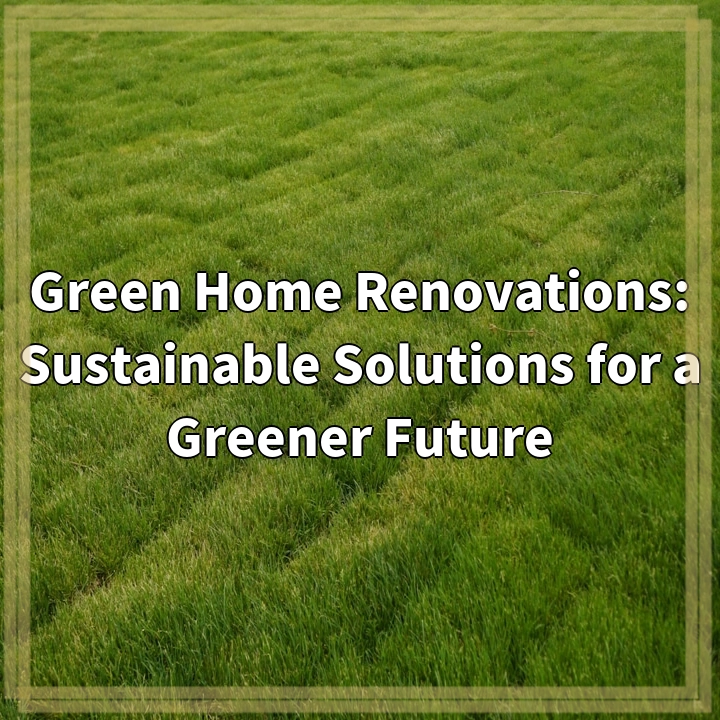Physical Address
304 North Cardinal St.
Dorchester Center, MA 02124
Physical Address
304 North Cardinal St.
Dorchester Center, MA 02124

Green home renovations refer to the process of upgrading or remodeling residential spaces with a focus on sustainability and environmental responsibility. This approach aims to reduce the ecological footprint of homes by incorporating energy-efficient appliances, sustainable materials, and eco-friendly practices. Over the years, green renovations have gained popularity as homeowners look for ways to lower energy costs, improve indoor air quality, and enhance the overall comfort of their living spaces while contributing positively to the environment.
Green home renovations often involve several key aspects, including:
Installing energy-efficient windows, insulation, and HVAC systems to minimize energy consumption.
Using reclaimed or sustainably sourced materials to reduce waste and environmental impact.
Incorporating water-efficient fixtures and landscaping practices to minimize water usage.
Selecting non-toxic paints, finishes, and materials to enhance the health of occupants.
Despite the benefits of green home renovations, there are several real-world problems and challenges associated with them that homeowners and contractors face:
One of the primary barriers to adopting green renovations is the upfront investment required. Energy-efficient appliances, sustainable materials, and eco-friendly technologies can be more expensive than traditional options. While these investments may lead to savings in the long run, not all homeowners can afford the initial costs.
In some areas, the availability of sustainable and eco-friendly building materials can be limited. This scarcity can hinder the ability to pursue certain green renovation projects, forcing homeowners to compromise on their sustainability goals.
Many homeowners may be unaware of the options available for green renovations or may lack the necessary expertise to make informed decisions. This can lead to poor choices that do not maximize the potential benefits of sustainable practices.
In some regions, local regulations and building codes may not fully support or incentivize green renovations. This can create further obstacles for homeowners trying to implement sustainable practices in their renovation projects.
Green renovations often require a long-term commitment to sustainability, involving ongoing maintenance and potential upgrades to keep up with evolving technologies. Homeowners may struggle with this commitment, especially if they plan to sell their homes in the short term.
Measuring the actual benefits of green renovations can be complex. Homeowners may find it difficult to quantify energy savings, improved air quality, or environmental impact without proper tools and resources.
While interest in sustainable living is growing, some homeowners worry about whether green renovations will translate to increased resale value. The demand for eco-friendly homes can vary significantly by market, impacting investment decisions.
Addressing the challenges of green home renovations requires a multifaceted approach. By implementing the following solutions, homeowners can overcome barriers and successfully pursue sustainable practices in their renovation projects.
Homeowners should invest time in learning about green renovation options, including energy-efficient technologies and sustainable materials. Workshops, online resources, and consultations with eco-friendly contractors can provide invaluable information to make informed decisions.
Research available grants, subsidies, and tax credits that promote green renovations. Many local and federal programs encourage homeowners to adopt sustainable practices, making the initial investment more manageable through financial support.
Engaging contractors and architects who specialize in green building practices can streamline the renovation process. These professionals can provide insights into sustainable materials and technologies, ensuring that renovations align with best practices.
Homeowners can pursue green renovations in stages, allowing them to spread costs over time. Starting with smaller projects, such as upgrading insulation or installing energy-efficient appliances, can set the foundation for more extensive renovations later.
Getting involved in local advocacy efforts to promote policies that support green renovations can benefit the broader community. Engaging with local governments about building codes and incentives can lead to a more favorable environment for sustainable practices.
Investing in energy monitoring technology can help homeowners track energy savings and improvements in air quality. By analyzing data, individuals can make informed adjustments and validate the effectiveness of their green renovations.
Homeowners should be aware that green renovations can enhance property value, especially as the demand for eco-friendly homes continues to grow. Highlighting energy-saving features and sustainable materials can make homes more appealing to potential buyers.
Green home renovations provide sustainable solutions for a greener future. By addressing the challenges and implementing the solutions mentioned above, homeowners can make a positive impact on the environment while enjoying the benefits of energy efficiency, improved air quality, and increased property value.
If you’re wondering where the article came from!
#